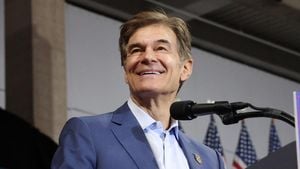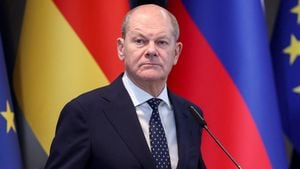Elon Musk's recent initiatives, particularly his involvement with the new "Department of Government Efficiency" (DOGE), have stirred significant conversations around the future of tax filing in the U.S. The anticipation centers on the possible launch of a mobile app aimed at simplifying tax processes, potentially allowing Americans to file their taxes at no cost directly with the IRS. This excitement, or anxiety, has already sparked reactions on Wall Street, where stocks of major tax preparation companies like Intuit and H&R Block have taken noticeable hits.
The saga began when reports surfaced about Musk and entrepreneur Vivek Ramaswamy discussing plans for the app, which would represent one of the most substantial shifts in how taxes are filed since the dawn of digital tax preparation. The idea is not just to create another tax app but to overhaul the bureaucratic complexity surrounding tax filing, which Musk has criticized for its overwhelming size and opacity.
According to reports from the Washington Post, these discussions are still at a very preliminary stage, yet the prospect of filing taxes via a phone app has already led to declines of 8.2% for H&R Block and 5.1% for Intuit on the stock market. These drops signal investors' concerns about the disruptive potential of government-backed tax applications replacing traditional services provided by these firms. H&R Block generates about $4 billion annually from tax preparation services, whereas Intuit's TurboTax accounts for nearly $5 billion of its annual revenue, raising alarm among shareholders.
Musk's plans could cut deeply, especially considering the current back-and-forth over tax preparation services between government agencies and private corporations. The IRS has long faced criticism over its relationship with taxpayers, especially concerning the Free File program, which is meant for income thresholds and has complex eligibility requirements. These limitations mean many taxpayers find themselves seeking paid solutions like TurboTax or H&R Block.
Despite the existing systems, such as the IRS’s Direct File pilot program launched last year, free filing remains tangled with income limits, complicate the opportunity to file taxes without incurring costs. This program allows eligible taxpayers with specific financial situations to submit directly via the IRS's platform—something critics argue the IRS could expand, especially through technological advancements like the proposed app.
The DOGE commission, motivated by Trump, aims to investigate and remove what it sees as excessive regulations, and advocates for slashing federal expenses—turning the conventional tax code on its head. Reports indicate Musk and Ramaswamy have discussed not only the app but also broader changes to the tax system, aiming for simplification and efficiency. Such intentions cast the spotlight brightly on the struggle between the burgeoning digital economy and longstanding tax practices.
On social media, Musk has echoed sentiments about the tax code’s complexity. He noted the tax code ballooned from 1.5 million words to over 16 million since 1955—illustrative of the sort of governmental maze individuals face when filing taxes today. It’s noted Americans attempt to file taxes and spend approximately 6.5 billion hours on this task annually, which Musk argues must be reduced drastically.
Considering all this, the potential transition to mobile tax filing isn’t merely about convenience; it’s part of larger political conversations surrounding government efficiency, public access to services, and competition against longstanding commercial enterprises. With Democrats weary of the private tax industry's influence, particularly evident with lobbying efforts from Intuit and H&R Block, the shift to government-supported applications could represent a microcosm of broader economic policy changes.
Some analysts have expressed mixed feelings. While bullish investors may see these developments as overreactions, data speaks for itself: the possibility of IRS involvement has consistently unsettled private tax preparers. Analysts from Jefferies commented on the recent stock declines, labeling them overly dramatic, pointing out there’s still likely much red tape and hurdles before any free app becomes viable.
But on the other hand, Bloomberg Intelligence analyst Andrew Silverman has suggested any IRS tax filing app could threaten revenue streams for traditional tax service providers significantly. If successful, such government-backed services could dent what has long been considered stable revenue sources for these entities, swaying users away from paid options.
Despite the initial roaring stock market responses, the reality is consumers have long desired simpler and cheaper methods for tax preparation. Ramaswamy has voiced strong support for this vision, stating during the discussions about the app's viability, they aim to rid users of unnecessary hurdles—prompting wide-ranging support from taxpayers burdened with complicated filing processes.
All of this raises intriguing questions about the future of tax filing systems. Will the IRS and governmental agencies rise to fully replace commercial tax services? And if this happens, what will be the toll on equity markets, on jobs related to tax preparation, and on the regulators enforcing compliance? Due to advancements like artificial intelligence, clarity could soon arrive at tax season, which has historically been stressful for many Americans. The prospect of mobile tax filing might substantially reshape the interaction between taxpayers, the IRS, and private companies lurking behind tax services. Regardless of how it all pans out, it’s evident the potential app has prompted dialogues and market movements none could have expected just weeks ago.
For now, as consumers eagerly await what changes may lie ahead, one thing feels certain: the tax filing industry is on the precipice of a potentially historic transformation. If the DOGE plan materializes, it may redefine operational frameworks, both for government bodies and private enterprises, ushering in what many hope is simplicity and efficiency where complexity has long reigned.



